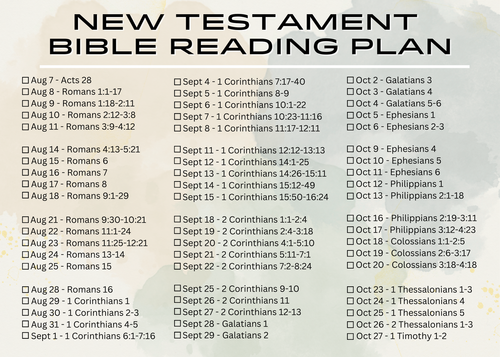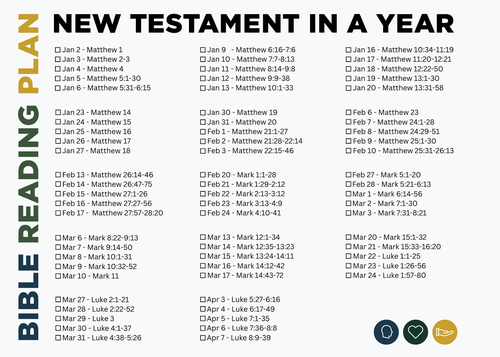The Lord's Supper And Spiritual Gifts
1 Corinthians 11:17-12:11
When the church gathers, members need to build each other up. The purpose of coming together as a church is for every member to benefit from the experience. However, the Corinthians' way of celebrating the Lord's Supper hurt the members. Due to divisions among them, the wealthier Christians were not partaking in the Lord's Supper but instead indulging in their own meals. This resulted in the less fortunate members barely eating anything while the wealthier ones feasted excessively to the point of drunkenness. The social elites were segregating themselves from the less privileged individuals. It is crucial to remember that no Christian is superior to another. Therefore, how can a Christian truly honor Jesus' sacrifice while disregarding fellow believers?
The Lord's Supper is a precious memorial, reminding individuals of Jesus' sacrificial death. During this celebration, the church commemorates Jesus' body and blood, symbolizing the inauguration of the new covenant. Abusing the Lord's Supper falsely proclaims Jesus' cross-work as engaging in sinful attitudes and actions that foster division in the church, particularly by marginalizing the poor, is considered an "unworthy manner" in this context. Before participating in the Supper, individuals should engage in self-examination. Specifically, this involves reflecting on whether there are any unresolved conflicts with fellow church members. In a broader sense, this principle can apply to any unconfessed sin, although that is not the main focus in this particular context. The body of Christ, representing the church, is called to emulate Christ's selflessness and sacrificial nature.
Some individuals have faced consequences from God and have experienced weakness, illness, or even death. It is important to note that not every instance of sickness or death directly results from God's judgment for sin (such as the case of the man born blind in John 9). However, there are situations where God does judge Christians differently than non-Christians. God condemns non-Christians but disciplines Christians (as mentioned in Hebrews 12:5–11). The purposes of punishment and discipline vary; punishment maintains justice, while discipline aims to transform character. One of the reasons for God's discipline is to prevent Christians from experiencing condemnation. In other words, divine discipline is a means ordained by God to help Christians persevere. This sentence hints at intrigue for future readers unaware of the nature of these "other things."
In this passage, Paul emphasizes the importance of the Spirit and the spiritual gifts that the Spirit distributes and empowers. A spiritual gift is a ministry that the Spirit imparts and empowers in individual Christians to benefit the entire church. When enabled by God's Spirit, believers cannot speak against Jesus. Only those whom the Spirit enables can genuinely testify that Jesus is Lord. The term "varieties" may refer to the different distributions of gifts, encompassing various kinds and the idea of God's distribution. The phrase "to each is given" indicates God bestows spiritual gifts to every Christian. The "manifestation of the Spirit" refers to displaying the Spirit's work accomplished through spiritual gifts. The ultimate purpose of these diverse gifts is for the common good and the church's edification.
Several points to consider:
The Spirit distributes spiritual gifts to individual Christians, and it is within His sovereignty to determine how each believer is empowered. Therefore, it is sinful to be discontent with the gifts that the Spirit has distributed to individuals or the church.
The Lord's Supper is a precious memorial, reminding individuals of Jesus' sacrificial death. During this celebration, the church commemorates Jesus' body and blood, symbolizing the inauguration of the new covenant. Abusing the Lord's Supper falsely proclaims Jesus' cross-work as engaging in sinful attitudes and actions that foster division in the church, particularly by marginalizing the poor, is considered an "unworthy manner" in this context. Before participating in the Supper, individuals should engage in self-examination. Specifically, this involves reflecting on whether there are any unresolved conflicts with fellow church members. In a broader sense, this principle can apply to any unconfessed sin, although that is not the main focus in this particular context. The body of Christ, representing the church, is called to emulate Christ's selflessness and sacrificial nature.
Some individuals have faced consequences from God and have experienced weakness, illness, or even death. It is important to note that not every instance of sickness or death directly results from God's judgment for sin (such as the case of the man born blind in John 9). However, there are situations where God does judge Christians differently than non-Christians. God condemns non-Christians but disciplines Christians (as mentioned in Hebrews 12:5–11). The purposes of punishment and discipline vary; punishment maintains justice, while discipline aims to transform character. One of the reasons for God's discipline is to prevent Christians from experiencing condemnation. In other words, divine discipline is a means ordained by God to help Christians persevere. This sentence hints at intrigue for future readers unaware of the nature of these "other things."
In this passage, Paul emphasizes the importance of the Spirit and the spiritual gifts that the Spirit distributes and empowers. A spiritual gift is a ministry that the Spirit imparts and empowers in individual Christians to benefit the entire church. When enabled by God's Spirit, believers cannot speak against Jesus. Only those whom the Spirit enables can genuinely testify that Jesus is Lord. The term "varieties" may refer to the different distributions of gifts, encompassing various kinds and the idea of God's distribution. The phrase "to each is given" indicates God bestows spiritual gifts to every Christian. The "manifestation of the Spirit" refers to displaying the Spirit's work accomplished through spiritual gifts. The ultimate purpose of these diverse gifts is for the common good and the church's edification.
Several points to consider:
- Paul's list of spiritual gifts list is not exhaustive and differs from other lists (12:28–30; 13:1–3, 8; 14:6, 26; Rom. 12:6–8; Eph. 4:11; 1 Pet. 4:11). Combining all the gifts from these lists does not result in a comprehensive compilation, as they are representative.
- The order of the gifts in Paul's list may not match exactly with other lists in the New Testament.
- It is possible for some Christians not to receive certain gifts.
- Having the ability to exercise a gift does not equate to spiritual maturity.
- Paul emphasizes that the Spirit is the source of empowerment for these gifts.
- Paul's grouping of the nine gifts is not clearly defined.
- Prophecy and tongues are mentioned last in Paul's list, likely because they are the primary gifts discussed in chapters 12-14.
- Paul does not precisely define each gift, so we can only guess what some of them are:
- Differentiating between the "utterance of wisdom" and the "utterance of knowledge" can be challenging.
- The gift of "faith" refers to a miraculous ability to trust God in a specific situation rather than saving faith.
- "Healing" likely includes an extraordinary faith and is a specific gift the Spirit distributes in certain situations.
- "Working of miracles" is a more general term encompassing the previous two gifts, demonstrating God's historical intervention.
- Further discussions on prophecy and tongues are found in subsequent passages.
- The "ability to distinguish between spirits" likely refers to evaluating prophecies wisely, discerning what is from God and what is not, particularly concerning demonic influences.
The Spirit distributes spiritual gifts to individual Christians, and it is within His sovereignty to determine how each believer is empowered. Therefore, it is sinful to be discontent with the gifts that the Spirit has distributed to individuals or the church.





Recent
Archive
2023
January
Happy New Year!He Will Save His People From Their SinsMy Beloved SonTemptation And MinistryThe SermonLeaving, Lying, Limits, Love, Largesse, and The Lord's PrayerTreasure, Anxiety, and JudgmentAstonishing AuthorityStorms, Demons, and HealingJesus Is CompassionateHis Eye Is On The SparrowSwords, Rewards, and MessengersThe Lord of the SabbathBlasphemy, Bad Trees, Signs, and FamilyStories, Sowers, and SoilsParables, Hidden Treasure, and RejectionFame, Food, Fear, Faith, and FringeReal Issues And The Power Of GodDying To Find LifeLike The SunChildren, Temptation, Sheep, And ForgivenessMarriage, Kids, And MoneyTo Serve And Give His Life
February
The ArrivalStories That StingQuestion TrapsHidden Motives And LamentThe End...?UnexpectedReady?Punishment, The Plot, And PerfumeTreachery, Passover, and The CupBetrayal, Injustice, And DenialThe Field Of Blood And The GovernorCrucifixion And DeathAll AuthorityMark—The Beginning Of The GospelHealing, Preaching, And The Forgiveness Of SinEating With Tax Collectors, Fasting, The Sabbath, And An Escape BoatThe Twelve, Blasphemy, Family, And A ParableParables And PowerA Different Kind Of StormPower Had Gone Out
March
Death, Hunger, And MiraclesCommandment Or TraditionDo You Not Yet Understand?The Christ And A Glimpse Of His GloryUnbelief, Confusion, And SinDivorce, Children, And PossessionsTo Give His Life As A RansomHosannaThe Rejected Stone, Taxes, And The Great CommandmentDestruction And The EndNo One Knows, An Anointing, And A Promise To BetrayPassover And GethsemaneThe Kiss, Arrest, And DenialPilate, Simon, And The CrucifixionDeath, Burial, Resurrection, And What\'s NextTheophilus And A Visit From GabrielMary And The MagnificatBenedictusThe Arrival And The ShepherdsSimeon, Anna, And The SpiritFruits Keeping With Repentance And BaptismThe Wilderness, Nazareth, And CapernaumSimon's Mother-In-Law, Fishing, A Leper, And Sins
April
Tax Collectors, Fasting, Sabbath Controversies, And The TwelveWhy Do You Call Me Lord, Lord?Jesus Marveled, A Raised Son, And QuestionsA Sinful Woman And A ParableObeying The Word, A Storm, And DemonsTwelve Years, Twelve Apostles, And SpeculationGreater, Costly, And GloryNot Getting It, The Cost, And AppointedWoes, Neighbors, And What Is NecessaryHelp Us Pray And A Divided Kingdom?Signs, Lights, And WoesHypocrisy, Fear, A Fool, And AnxietyParables, Division, And The TimesWarnings, A Daughter Of Abraham, And Jerusalem, JerusalemA Son Or An Ox, Parties, And DiscipleshipLost ThingsThe Dishonest Manager, The Law, And Anguish In This FlameMillstones And Mustard SeedsPersistent Prayer, Humility, A Childlike Faith, And The Rich RulerEverything That Is Written, A Blind Beggar, And A Wee Little Man
May
A Parable, A Colt, A Prophecy, And A CleansingAuthority, Wicked Tenants, And TaxesThings To Beware Of And WidowsDestruction, Persecution, The Son Of Man, And WatchingThe Plot, Betrayal, Lord's Supper, And Inappropriate BehaviorPrediction, Fulfillment, Agony, Betrayal, And DenialMistreated, Taken Before The Council, Pilate, Herod, And Delivered To Be CrucifiedCrucifixion, Death, And BurialHe Is Not HereDisbelieved For JoyIn The Beginning…The Lamb Of God And A WeddingZeal, What's Inside, And Born AgainHe Must Increase
Categories
no categories
Tags
no tags
